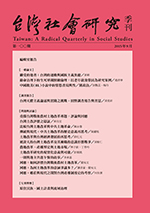
《台灣社會研究季刊》 第100期:

編輯室報告
【一般論文】
繼受的他者︰台灣的運動與國族主義焦慮/姜穎(100 民104.9 頁3-52)
現代運動與國族主義乃是西方現代性的產物,兩者在作為繼受國的台灣社會中交織出一個特殊的相互關係。甚至,我們可以說,去除了國族主義的成分將難以思考台灣的運動/體育。承襲了西方現代性對於台灣社會的意義,現代運動與國族主義在台灣社會醞釀出一種持續焦慮的詮釋與實踐方式。本文透過歷時性的文本分析,揭示出一種長存的「東亞病夫式焦慮」存在於台灣的運動與國族主義場域。從日本殖民開始,現代運動/體育以一種文明開化的象徵為台灣人帶來恥辱與驕傲,而這種情懷隨著國族主義論述在台灣社會的變遷,歷經了體育救國、莊敬自強到台灣之光的不同運動/體育論述主軸,依舊是台灣運動與國族主義論述的基調。
關鍵詞: 運動社會學、現代性、遲到的現代性、治理、在地化
Both nationalism and sport were established on the basis of Western modernity. This research built contextualized and historical understandings of the interrelation of sport and nationalism in Taiwan. As the “other” of inheritances, there is a perpetual, collective anxiety of sport and nationalism in Taiwan. Since the Japanese colonization, modern sport became a symbol of civilization. It caused both humiliation and proudness. On the other hand, sport/physical education became a significant means to achieve national goals, build national identity and arouse patriotism. The hunger for the “glory of Taiwan” and nationalistic sentiments are still the undertone of the imagination and practice of sport in the anxious nation.
Keywords: sociology of sport, modernity, belated modernity, governmentality, localization
餘命治理下的生死界閾照顧倫理︰以老年就養榮民為研究案例/趙彥寧(100 民104.9 頁53-90)
本文以老年就養榮民的臨終照護為民族誌研究案例,回顧既存勞動社會學文獻,以分析新自由主義以價維生之醫療市場邏輯運作過程,並闡釋此類照護的倫理實作內涵。本文認為,若忽視禮物和商品交換雙元性道德經濟互構的事實,將遮蔽了形塑底層看護勞動的多重階級、性別、地理政治與族群交織的結構性因素,並再次強化了結構性剝削的效應,甚且將受害者轉化為社會不義的代罪羔羊。本文也強調,底層照護之所以可以持續,並非盡然出自不得不然的經濟考量,而多出於另類照顧與被照顧的倫理實踐和體會,故而,照護勞作不應化約為貨幣對價關係。最後,基進照護必須奠基於可以跨越個人與集體性創傷的想像能力之上,而這個理解也可作為思考新自由主義體制下新興生命契機的起點。
關鍵詞: 倫理、照顧、老年榮民、新自由主義、看護
Based on ethnographic research of elderly veterans’ terminal-care practices, this paper examines the ways in which neoliberal medical institution transforms life value into commodity. Reflecting upon conventional works on sociology of labor, it aims also to demonstrate the ethical essence of this form of caring work. It maintains that, without paying close attention to the mutually constitutive relationship between gift and commodity exchanges, researchers may overlook how the interlinking connections between class, gender, ethnicity and race, as well as geopolitics marginalize caretakers and further penalize them as the scapegoat of structural injustice. It highlights the fact that, while economic concern may affect significantly caretakers’ job decision, they choose to stay on, in spite of relatively meager income, mainly due to the ethical practice and empathetic emotion elicited by the process of caring and being cared for. In other words, the value of caregiving shall not be reduced into purely monetary terms. To rethink the possibility of creating emerging life potentialities under the shadow of neoliberal regime, the paper then argues for alternative forms of imagination that can bridge and also go beyond individual and social traumas. With such an imaginative blueprint in mind, radical modes of caring-and-being-cared-for may come into practice along with collective benefits.
Keywords: ethics, caregiving, elderly Veteran, Neoliberalism, caretaker
中國耽美(BL)小說中的情慾書寫與性/別政治/徐艷蕊、楊玲(100 民104.9 頁53-90)
耽美小說是一種主要由女性書寫、閱讀的男男同性情愛故事。本文檢視了耽美小說的情慾書寫和快感機制,嘗試在具體的社會文化脈絡下理解耽美小說中的性幻想、性暴力和性政治。文章首先分析了耽美小說中種類繁多的男性身體表徵,指出女性主動創造投射其慾望的男色形象,並在女性社群中廣泛分享的行為,在華人社會中是史無前例的。同時,耽美小說還提供了更加多樣化的、禁忌性更強的情慾模式,每一種情慾模式都隱含著獨特的性政治議題。本文特別探討了耽
美小說中普遍存在的強姦情節,以及這種情節如何為女性提供了想像性的解决制度性暴力的方法。由於擺脫了異性戀體制中男主女從的固定程式,耽美不僅能以一種更為自由的態度處理親密關係中的角色扮演、權力分配和快感生成,還能為性/政治方面的禁忌性話題提供更多的探索空間。
關鍵詞: 耽美、情慾、性幻想、性暴力、性/別政治、中國
Boys’ Love (BL) fiction is a genre of male-male love stories mostly written by and for women. This paper examines the portrayal of erotic desires and the
mechanism of pleasure in BL fiction in an attempt to understand the sexual fantasy, violence, and politics of BL within the concrete sociocultural context of Mainland China. The paper first analyzes various types of the male body represented in BL. For the first time in Chinese society, women have actively created sexualized male images according to their own desires and circulated them widely in female community. Meanwhile, BL fiction has offered more diverse and transgressive modes of sexuality, each of which has unique implications for gender/sexuality politics. The paper particularly investigates how BL fiction uses rape, a common plot device, to offer women imaginary solutions to institutional violence. Freed from the heterosexual regime that legitimizes male dominance over women, BL not only fosters a more liberal attitude towards issues of role-playing, power distribution, and the production of pleasure in intimate relationships but opens up more space for exploration of taboo subjects concerning sex and politics.
Keywords: Boys’ Love, erotic desire, sexual fantasy, sexual violence,gender/sexuality politics, China
【調查報告】
台灣天體主義論述與實踐之挑戰:田野調查報告與省思/黃斐新(100 民104.9 頁123-155)
台灣天體主義的主流論述採「去性意識化」路徑,來回應著衣社會高度性意識化天體實踐和天體實踐者,以建構台灣天體主義的正當性。然而,台灣天體論述和實踐之間存在衝突,於論述層面將公共裸體與社交裸體去性意識化,在實踐層次則顯露異性戀性傾向核心,以生理性別、社會性別和性傾向來規劃天體活動。從天體女性位置看天體主義實踐,同樣出現斷裂︰實踐天體主義帶來解放、自由的感覺,突破父權社會對女性裸露的禁忌,但天體場域與天體社群也延續父權著衣社會的性別結構,致使女性天體主義者持續面對女性生理身體及其社會性別的性議題,如性化與性騷擾。反倒是台灣的邊緣天體實踐與論述能夠超越天體主流論述在著衣社會的推廣考量,較能貼近真實地探討天體主義者的性意識,肯認天體實踐中的性多元實踐,使天體論述能如實呈現現場運作。台灣天體論述與實踐兩者間的斷裂是台灣天體主義發展的挑戰,然而如何定位天體主義中的性意識,以在著衣社會推廣天體主義,同時也是契機,可使天體主義正視天體實踐者的性實踐和性意識,使天體論述如實反映天體實踐的性別議題。
關鍵詞: 天體主義、天體主義女性、性意識、異性戀霸權、父權社會
In response to the tendency of clothed society to highly sexualize naturists and their practices, mainstream Taiwanese naturist discourse applies “asexual” and family-oriented approaches to construct social legitimacy for naturism and naturists. Yet, core beliefs about the importance of biological sex, gender, and sexual orientation in heterosexual, hegemonic, patriarchal, and clothed society still take effect in naturist activities and organizations, leaving naturist women feeling ambivalent toward naturist practices. While naturist practices create a space for women to break free from clothing constraints and gender segregation in nudity so as to further explore body experiences, hence empowerment, naturist women still encounter conventional gender and sexual issues, such as male gaze and sexual harassment. Marginal Taiwanese naturist discourse, on the other hand, recognizes the problems of gender, sexuality issues and sexual activities in naturist practices, and hence is able to create naturist discourses that can better reflect real-life naturist practices. The gap between Taiwanese naturist discourses and practices pose a challenge to Taiwanese naturism. How to construct sexuality in naturist discourse so as to promote naturist practice in a clothed society while dealing with the disjunction between the reality of naturist discourses and naturist practices poses a challenge as well as opportunity for Taiwanese naturism to reflect upon naturists’ own gender, sexuality, and sexual practices in an effort to reconstruct naturist discourses that would better present a wide range of naturist practices.
Keywords: Naturism/Nudism, Naturist Women, sexuality, heterosexual hegemony, patriarchy
【問題與討論】重探台灣戰後農村土地改革專題︰評論與回應
編按/瞿宛文(100 民104.9 頁157-158)
台灣土改評價之辯証/華昌宜(100 民104.9 頁159-162)
比較台灣土地改革與中共土地革命/陳永發(100 民104.9 頁163-170)
傳統與現代︰中共土地改革的歷史意義再思考/陳耀煌(100 民104.9 頁171-182)
土地改革與台灣經濟發展的再思考/薛化元(100 民104.9 頁183-195)
被誇大的台灣土地改革及其漸熾的意識形態戰爭/黃樹仁(100 民104.9 頁197-215)
農地改革、產權界定與土地市場/林子欽、丁秀吟(100 民104.9 頁217-228)
土地改革研究的現實化意義與可能/彭揚凱(100 民104.9 頁229-234)
一則與地主共進午餐的故事/李承嘉(100 民104.9 頁235-250)
回應:如何評價台灣戰後農村土地改革/瞿宛文(100 民104.9 頁251-256)
回應:為何土地改革的意涵爭議多?/廖彥豪、瞿宛文(100 民104.9 頁257-260)
回應:鄉莊與現代之間對台灣產權制度史的考察/何欣潔(100 民104.9 頁261-264)
【左異聲響】原住民族、國土計畫與流域治理
編按/官大偉(100 民104.9 頁265-267)
複合式農林業與非都市土地使用管制:以石門水庫集水區為例/顏愛靜、陳亭伊(100 民104.9 頁269-282)
民間組織參與流域綜合治理的經驗/周素卿(100 民104.9 頁283-289)
泰雅族傳統領域與流域治理的啟示/林益仁(100 民104.9 頁291-310)

